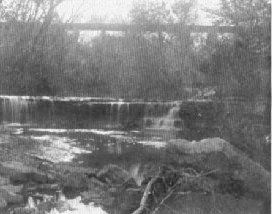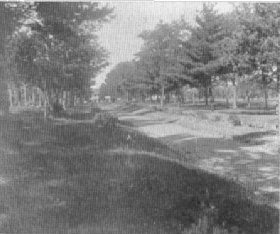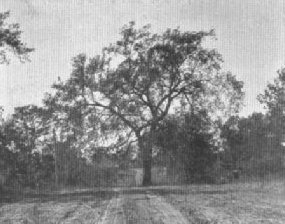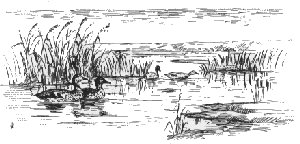 |
THE RIVER
Whirling and swirling, swift and strong,
O River, pause and answer me!
What is the burden you bear along?
The River paused not, nor answered he.
Yet I caught one strain of his murmured song!
"I bear the Mountains down to the Sea."
 FTER all, though the noble Red man perish from the earth and be "as a tale that is told," he will leave a precious legacy to the race of Palefaces; he may go to his happy hunting-grounds with never a bend in his proud neck. The names that in his gladness or in his fear, with his unspoiled child instinct of description, he bestowed upon river and mountain are ours without prick of conscience. Yet truly we did borrow, like the new neighbor that we were. We sprinkled the picturesque names of these real Americans like salt from east to west, and from north to south, over almost every acre of our fair land. No return was required, but surely we must repay in recognition. One shudders to
FTER all, though the noble Red man perish from the earth and be "as a tale that is told," he will leave a precious legacy to the race of Palefaces; he may go to his happy hunting-grounds with never a bend in his proud neck. The names that in his gladness or in his fear, with his unspoiled child instinct of description, he bestowed upon river and mountain are ours without prick of conscience. Yet truly we did borrow, like the new neighbor that we were. We sprinkled the picturesque names of these real Americans like salt from east to west, and from north to south, over almost every acre of our fair land. No return was required, but surely we must repay in recognition. One shudders to
 |
think what names might have befallen us other wise. The seventeenth century Anglo-Saxons lacked the pictorial powers of the Red man. To their wondering gaze everything was New this or New that, or else for the sake of policy or man-glorification, it must be called after the discoverer, the founder, or one of the Great Ones in the mother country. The French and the Spaniards gave many satisfying names in the new land, but their "St," and their "San" grow a little wearisome. Fortunately, no one with an infallible, expansive system of nomenclature was on the ground to fix such names as East River, East Branch, Middle River, North by North-west Fork, or the like. So we are blessed in having the Connecticut, the Ohio, the mighty "Father of Waters," and the "Big Muddy." It

is a boon for which we might be very grateful, in a world where Romance is dying.
 |
Inconsistent as it may seem, all sons of Noah love flowing water. A bubbling, gushing mountain brook is a stream that flows from the heart of Nature to the soul of Man. But even the swirling old Missouri, famed among the nations, wallowing around among its mud-banks, possesses a fascination that all must feel. True, it flows muddy and yellow, choked with sand bars, and the bluffs along its sides rise barren and steep. It lacks all the suggestiveness of purity that belongs to the crystal "little rivers," so loved by wildwood wanderers. But it has a majesty and grandeur, like the mountains that give it birth. Walk beside the water’s edge, let its influence then have complete sway, and you will find that a silence falls upon you, as if you were listening to a benediction, "It quiets a man down like saying his prayers." I have roamed beside streams that seemed an invitation to laughter. But the mood of the Big Muddy is an impressiveness approaching solemnity. Its deep, ceaseless song is an epitome of the anthem of the Universe,
 |
The awful sense that the River is crawling leaves you, if you stand close beside it and watch it swirling and eddying on its way. There is motion, swift as the waltz, but the rythm is slow and steady, so that one would not tire, though he sat and gazed all day. It flashes and
 |
sparkles in the sunlight, and when the wind blows, as it still does occasionally in this rescued desert, the white-caps spin along right merrily. Yet on the whole the River seems a sedate old servant, bent on carrying out its homely mission.
Seen from the bluffs of the Old Town, the
River is a wide, glassy highway that winds unwillingly on the Nebraska side, yoked by its enemy, the long bridge. If it were not for the bridge, might not the river riot at will over the wide valley? The Iowa bluffs in the distance are the daytime haunt of the purple and gray
 |
mists that creep out in the night to cover River and Town. Once the River sang its song nearer to their feet. Who knows but it may do so again, though riprappers work like beavers all winter long?
If you would appreciate the deeper meaning
of the Red man when he decreed that all who followed him should say "Big Muddy," you had best clamber about the bluffs as he did, and find your lookout unhindered by roads. Yet several highways leading from the Old Town will take you to views of magnificent sweep. Follow the road over Kearney Hill to the southeast, past pleasant thrifty old farms; a delightfully rough byway, — would you always have smooth sailing?—leads through an uncanny willow swamp, and at length up the bluff by the back door. Neither brush nor camera can picture that view for you,—the wide, many-colored valley, level
 |
as a floor below you, with a silver ribbon winding and turning in the midst between great ramparts, —winding away to the north and away to the south as far as eye can see, What a mighty course it runs, this strong old River that guards a Promised Land
Merry rivulets trickle down through brush tangles to join the rolling current; in the valleys are quiet bayous where waters pause and placidly mirror the sky in their depths. But the River heeds them not. It never rests, it never sleeps. Its beauty is the beauty of Power. It is kin to the Ocean and to Eternity.

The Green-Clad Glory
Return to Legacy
© 2001, Lynn Waterman